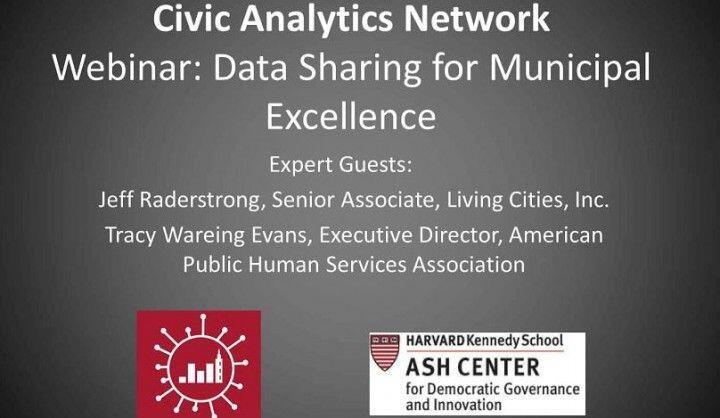- November 17, 2016
- Civic Analytics Network
Data sharing across government departments can deliver real, meaningful impacts, making the delivery of services more efficient and helping to facilitate an interoperable system of governance. Stephen Goldsmith argues that the practice of sharing data should be government’s default setting because the benefits of interconnected data systems far outweigh the risks associated with implementing such programs.
But some longstanding challenges stand in the way of data sharing becoming the default and key questions remain for cities that have yet to incorporate data sharing as a core practice. What does a plan for an effective data sharing program look like? How does a government navigate the complex confidentiality laws surrounding human service data? What are the specific benefits of data sharing, anyway?
The Civic Analytics Network hosted a webinar, “Data Sharing for Municipal Excellence,” to address these very issues and highlight best practices. Jeff Raderstrong, Senior Associate with Living Cities, and Tracy Wareing Evans, Executive Director of the American Public Human Services Association, presented their findings and experiences with data sharing to an audience of Chief Data Officers, public officials, and interested citizens from around the world.
Raderstrong touched on the need for the effective and continuous use of data to track and manage progress in order to facilitate “collective impact,” one of Living Cities’ focus areas, and achieve large-scale social change. He outlined the process Living Cities suggests municipalities follow to share data to achieve more effective governance. The five step process involves 1) parties agreeing on the data, 2) finding the appropriate datasets, 3) presenting the data in a clear manner, 4) discussing the data productively, and 5) changing behavior and sharing responsibility for past results and the future implementation of changes as a result of the data sharing process.
Evans, a longtime public health executive with experience promoting the use of analytics in human services, described how data sharing and the resulting analytics capabilities are facilitating more agile, responsive, and accountable human service systems. She also outlined some tools to help local governments expand their capacity to become responsive to an operating environment that is increasingly driven by data across services. Calling upon her years of experience, she proposed a series of stages for municipalities when implementing data sharing in human services, ultimately recommending measures that reinforce population-level prevention of trauma and encourage positive health outcomes for communities.
To find out more about what these two experts had to say and to see their collection of resources, watch the recording of the “Data Sharing for Municipal Excellence” webinar here.
Further Reading and Resources
The Living Cities: Data and Collective Impact page highlights Living Cities' efforts and resources in this area.
The American Public Human Services Association's white paper, Roadmap to Capacity Building in Analytics, provides guidance to state and local health and human service agencies on implementing analytics efforts.
The National League of Cities and Stewards of Change's interactive toolkit, Sharing Data for Better Results: Guide to Building Integrated Data Systems, includes helpful information on privacy, regulation, and other relevant issues.
The Administration for Children & Families' Confidentiality Toolkit provides guidance on confidentiality requirements in state and local data-sharing efforts.
The Data Quality Campaign’s Seven Principles for Effective Data Sharing to Improve School-Community Collaboration includes seven principles of effective data sharing.

 Eric Bosco is a Research Assistant and Writer for the Ash Center’s Civic Analytics Network. Prior to joining the Ash Center, Eric worked as a journalist and research assistant with the Boston Globe Spotlight Team and as a staff writer at a regional newspaper in southern Massachusetts. As an undergraduate journalism student at the University of Massachusetts Amherst, his investigative reporting for the Globe on the university’s controversial confidential informant program earned him appearances on national television and radio.
Eric Bosco is a Research Assistant and Writer for the Ash Center’s Civic Analytics Network. Prior to joining the Ash Center, Eric worked as a journalist and research assistant with the Boston Globe Spotlight Team and as a staff writer at a regional newspaper in southern Massachusetts. As an undergraduate journalism student at the University of Massachusetts Amherst, his investigative reporting for the Globe on the university’s controversial confidential informant program earned him appearances on national television and radio.


